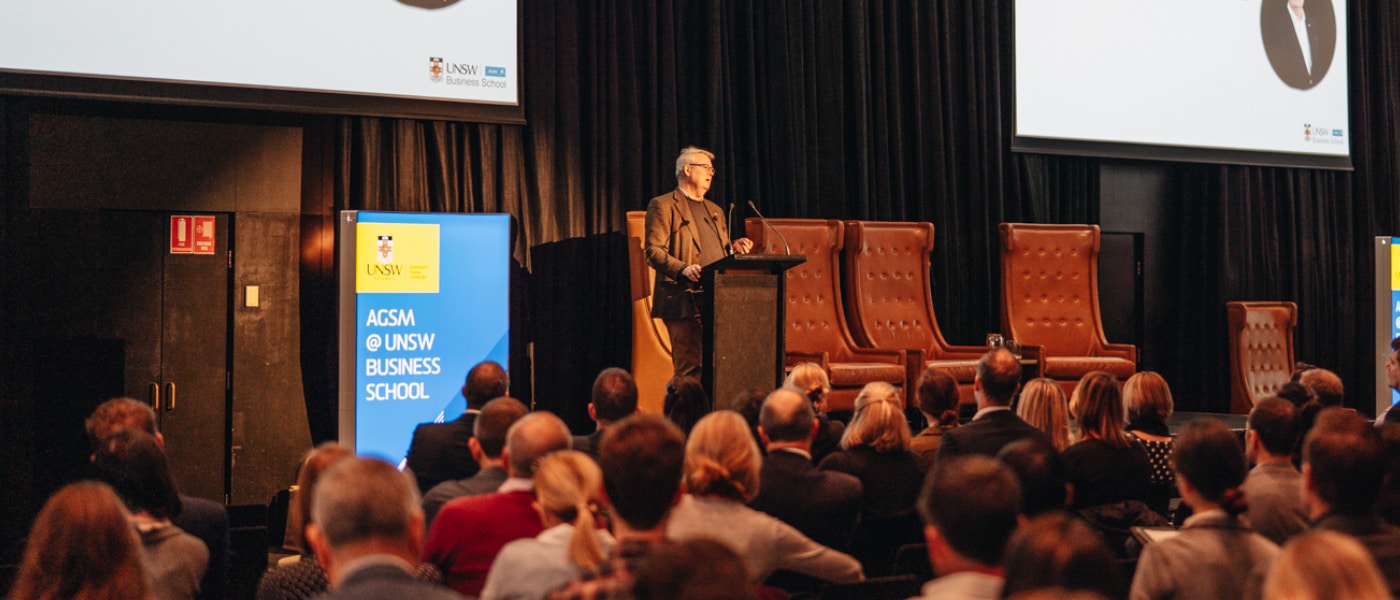The business who cried ‘woke’: The ethics of corporate moral grandstanding

The business who cried ‘woke’: The ethics of corporate moral grandstanding
Opinion + AnalysisBusiness + LeadershipClimate + Environment
BY Isabella Vacaflores 22 MAR 2022
Consumer responses are crucial to holding businesses accountable for their social and environmental responsibilities.
As of this year, over half of the highest polluting companies in Australia have committed to net-zero emissions targets. Meanwhile, in the Twitter-verse, dating apps and chocolate bars proclaim an end to police brutality, sexism, and the Uighur genocide.
Out of nowhere, big business has seemingly grown a social consciousness – and an impressive marketing budget to match. From fast fashion to mining, you’d be hard-pressed to find a company that doesn’t claim to be doing the right thing by their employees and the environment.
Moral grandstanding: When businesses fail to put their money where their mouth is
Unfortunately, a lot of this moral messaging is nothing more than opportunistic marketing, designed to profit from a societal shift towards conscious consumption. As recent reporting by Greenpeace highlights, of those Australian companies that claim to be going green, only a small fraction are actually taking effective steps by switching to cleaner energy sources.
Likewise, many brands divert attention from dubious business operations by aligning themselves with the popular side of trending moral discourse, tweeting out support for social justice movements while simultaneously being accused of the very issues they rally against. As in the following advertisement, which seemingly suggests that the solution to America’s police brutality problem is drinking Pepsi, even at best case, such messaging can come across as offensively tone-deaf.
This phenomenon is what philosophers Justin Tosi and Brandon Warmke describe as ‘moral grandstanding’ – the insincere use of principled arguments to self-promote or seek status. Similarly, the terms ‘virtue signalling’, ‘performative activism’, ‘green-washing’ and ‘woke capitalism’ describe how moral concerns can be deployed as a front for self-serving behaviour.
Ultimately, all these phrases describe the same thing, which is the failure of businesses to practice what they preach.
This hypocrisy is a problem because it prevents meaningful change from occurring while simultaneously misleading consumers into believing that we are well on the way to a better world when actually, progress flounders.
Doing something is better than doing nothing, except when it isn’t
Consequentialism asserts that actions are good if they cause more benefit than harm. Using this line of reasoning, many argue that insincerity is a small price to pay for having big business commit to less harmful commercial practices, which diminishes moral grandstanding to a largely trivial concern.
Yet, when we contemplate the opportunity cost of accepting such half-baked behaviour from those who have the most power to affect change, this argument quickly becomes self-defeating. Consider what would happen if businesses diverted the money and resources spent on advertising their moral character towards researching and enacting reforms that put substance behind these self-proclaimed progressive values.
As consumers, we cannot accept anything less than this because to do so would cause our planet and people to needlessly suffer – a harm that far outweighs any benefit gained from morally grandstanding promises to “do better”.
Additionally, from a deontological perspective, it can be argued that the intention behind moral actions is what truly determines their worth. Since morally grandstanding companies aren’t motivated by a principled duty, but rather, by a profit outcome, they can hardly be considered good (in a Kantian sense, anyway).
How to spot a moral grandstander
In the past half-decade, energy giant AGL has heavily advertised their pledge to decarbonise while simultaneously remaining Australia’s largest greenhouse emitter. Meanwhile, companies such as Woolworths, Coles and Telstra have quietly gotten on with transitioning to almost 100 per cent renewable energy.
Greenpeace campaign takes aim at AGL. Image by Monster Children Creative
Evidently, some businesses are being genuine with their environmental and social commitments. The problem with moral grandstanders is that they take the spotlight away from such efforts. As consumers, we can have a meaningful impact on our world by choosing to spend our money with the former, but the question remains of how to distinguish between the two:
- Consumers can start by asking themselves about the nature of the company which is making the moral appeal –are harmful business practices embedded in the industry they operate in? Does the business themselves have a poor social or environmental track record? If the answer to either of these questions is ‘yes’, then their claims should be viewed suspiciously.
- Be on the lookout for weasel words – buzz-wordy claims which are deliberately vague. Saying something is “green” or “eco-friendly” isn’t a qualifiable statement. Also, note that the validity of some credentials relating to fair trade and carbon emissions are being increasingly challenged.
- As with any investment, if you’re going to put your money into a business based on their moral claims, fact-checking is always a good idea. This can be done through a quick internet search or a skim through related news results.
Remember that in many countries (including Australia), consumer rights laws exist to ensure companies cannot get away with making false claims about their products. Holding businesses to account for their moral grandstanding is therefore not just an ethical imperative – but a legal one also.
Kendall Jenner advertisement and images courtesy of Pespi
Ethics in your inbox.
Get the latest inspiration, intelligence, events & more.
By signing up you agree to our privacy policy
You might be interested in…
Opinion + Analysis
Business + Leadership
Why do good people do bad things?
Opinion + Analysis
Business + Leadership
The dark side of the Australian workplace
Opinion + Analysis
Business + Leadership
Getting the job done is not nearly enough
Opinion + Analysis
Climate + Environment, Relationships
Care is a relationship: Exploring climate distress and what it means for place, self and community
BY Isabella Vacaflores
Isabella is currently working as a research assistant at the Global Institute for Women’s Leadership. She has previously held research positions at Grattan Institute, Department of Prime Minister & Cabinet and the School of Politics and International Relations at the Australian National University. She has won multiple awards and scholarships, including recently being named the 2023 Australia New Zealand Boston Consulting Group Women’s Scholar, for her efforts to improve gender, racial and socio-economic equality in politics and education.
Constructing an ethical healthcare system

Constructing an ethical healthcare system
Opinion + AnalysisHealth + WellbeingPolitics + Human Rights
BY Georgia Fagan 17 MAR 2022
Assessed from a distance, Australia’s healthcare system may seem to shine.
Contrasted with the near non-existence of subsidised medicine in the United States, and the increasing shortages of doctors and other specialists seen globally, Australia could be taken as providing healthcare at least a calibre above the rest. However, with a closer look, it quickly becomes apparent that one’s assessment of the ethical status of Australia’s healthcare system is one that is decidedly dependent upon the vantage point of the assessor.
When we narrow our scope and focus instead on the internal workings of the Australian system, holding it to a local, desired standard of performance, its ethical misgivings readily become apparent. If the role of a successful healthcare system is to provide equally for all, where illness, disability or socioeconomic status do not stand as features which reliably disenfranchise its users, then the current formation of our local system does not seem to ethically sparkle.
Dr Annmaree Watharow was a general practitioner for over two decades. She is a recent PhD graduate from the University of Technology Sydney where she completed her dissertation on the healthcare and hospital experiences of those who have dual sensory impairments. She has published works on topics ranging from improving communication within healthcare environments to fostering improved practice in research settings, along with personal testimonies on her experiences of living with deafblindness.
When I ask Dr Watharow what she takes to be the central ethical failure of our current healthcare system, she responds concisely:
“Parity of access to quality healthcare is the key ethical issue.”
If we agree that equal access is a central pillar to an ethical system of healthcare, we are required to understand who is currently being left out and why, in order to begin remedial work.
“Migrant populations, homeless, incarcerated, LGBTQI+, veterans, older Australians, Indigenous Australians, and people living with disability and chronic illness” are all social groups that Dr Watharow sees as belonging on the (not exhaustive) list of those who are directly and negatively impacted by the apparent partialities in contemporary healthcare systems.
Where there are losers, there are also winners – or, at the very least, those who remain comfortable in the current modes of national healthcare dissemination. When considering the broader Australian population, Dr Watharow suggests, “Multiple sections are disadvantaged, but you have a core group who are well positioned to leverage advantage. These are people with good income, good housing, good nutrition”.
Pre-existing social structures that both create and sustain sharp disparities in income, quality of housing, education and health work to negatively impact an individual’s wellbeing. These factors are oftentimes discussed as being ‘social determinants of health’, such that they directly affect a person’s risk of developing physical or mental illness. Dr Watharow importantly draws our attention to how those belonging to disenfranchised groups are subsequently more likely to be negatively impacted by facets of our social structure that reach far beyond the healthcare system.
“There are inadequacies in our social welfare, justice and recognition systems which fail these groups”, Dr Watharow explains. When considering current pensions and welfare allowances for example, it is apparent that some individuals have their health compromised long before they end up in a hospital bed. “The current funds don’t allow people to practice healthcare or good nutrition or have quality housing. All of these contribute to poorer healthcare outcomes.”
Evidently, assessments of the ethics of our healthcare system would be incomplete without an assessment of the broader society in which that system operates. Dr Watharow helpfully turns our focus to how broader, socioeconomic disadvantage necessarily breeds unequal access to and benefit from current systems of healthcare.
Better understanding these causal factors, which directly contribute to this inequality, usefully directs us towards finding pragmatic solutions, and Dr Watharow is clear in pointing out a pivotal step that is necessary to spur positive change: we need to provide a means by which the wide array of disenfranchised voices may articulate the intricacies of their own disadvantage.
“The lynchpin of the medical system should be shared decision making. For that to happen, everyone needs access, they need communication, and communication support if not able to communicate.” Ensuring the representation of marginalised voices in both research and political settings is a necessary step towards the shared decision making required for the construction of an ethical, inclusive healthcare system. If particular users of the healthcare system are silenced in their capacity to communicate their needs or experiences, inequality will be fostered.
Critically, creating the capacity for individuals to speak truth to the power is only the first step. “We need an attitudinal shift in how we treat those who are older, have a disability, or cognitive impairment. We need healthcare institutes to comply with the statues that exist on an international, national, and state levels that prohibit abuse, neglect, and violence, as well as promote healthcare.”
Dr Watharow emphasises that Australians, especially Indigenous Australians, living with disability are a key population who remain poignantly disadvantaged in the current healthcare system. Even with the construction of government services such as the National Disability Insurance Scheme (NDIS), these groups continue to suffer in the face of discriminatory social systems which stifle the capacity for their needs to be adequately heard across community, research, and political settings.
“I think the NDIS [National Disability Insurance Scheme] has severely short-changed First Nations peoples by not understanding that their disability experiences and needs are not the same as non-Indigenous. Disability is understood differently and there are major barriers to getting disability services to rural and remote regions. Added to this, many First Peoples need basic things like shelter, food, work; if you haven’t got the money for a bus fare to town you can’t go get assessed, if you haven’t got predictable housing how do you get home help?”.
Recognising the insufficiencies of social welfare schemes and the impact these have on practices of healthcare again draws our attention to the importance of addressing nationwide, systemic inequality in order to construct ethical systems of healthcare. Unfortunately, aiming to remedy broader social inequalities as a method to achieve equitable healthcare may appear a slow and arduous approach. Luckily, as Dr Watharow suggests, these ambitions need not be pursued in lieu of more targeted action.
“If we put in some basic work to expecting our health environments to be compliant with universal design principles and disability standards; if we expect our staff there to be aware, knowledgeable and compliant with accessibility and communication provisions (which are enshrined in legal statutes) and if we enforce these with audits, spot checks and evaluation of complaints, if we make it a condition of service that staff do yearly training and upskilling in providing equitable access and communication and care to PLWD [people living with disabilities], we can do so much!”
The process of constructing an ethical healthcare system in Australia requires both remedial and aspirational work. Currently, quality healthcare cannot be equally accessed by all. Understanding which groups face obstacles to access, and why, is a critical starting point for resolution. We require a commitment to ensuring individuals can communicate their needs and critiques of current models, and that these calls are heard and responded to. Concurrently, it must be demanded that pre-existing standards of care are reliably upheld and not entirely disregarded.
Critically, neither of these methods will be pursued if current attitudes toward particular members of our society remain engrained. As Dr Watharow offers, “a greater inclusion and tolerance of difference in all levels of society” is required if we are to garner the motivation required to remedy existing inequalities.
The solutions are multifaceted, slow, and likely expensive. But if we are committed to equality, both in systems of health and in our societies more broadly, the gap between those who can enjoy healthy lives, and those who cannot, should slowly close.
Ethics in your inbox.
Get the latest inspiration, intelligence, events & more.
By signing up you agree to our privacy policy
You might be interested in…
LISTEN
Health + Wellbeing, Society + Culture
Life and Debt
Opinion + Analysis
Health + Wellbeing, Relationships, Science + Technology
How to put a price on a life – explaining Quality-Adjusted Life Years (QALY)
Opinion + Analysis
Health + Wellbeing, Relationships
This isn’t home schooling, it’s crisis schooling
Opinion + Analysis
Health + Wellbeing, Relationships
Moral fatigue and decision-making
BY Georgia Fagan
Georgia has an academic and professional background in applied ethics, feminism and humanitarian aid. They are currently completing a Masters of Philosophy at the University of Sydney on the topic of gender equality and pragmatic feminist ethics. Georgia also holds a degree in Psychology and undertakes research on cross-cultural feminist initiatives in Bangladeshi refugee camps.
To Russia, without love: Are sanctions ethical?

To Russia, without love: Are sanctions ethical?
Opinion + AnalysisPolitics + Human RightsRelationships
BY Isabella Vacaflores 11 MAR 2022
The western world has responded to Russia’s unprovoked invasion of Ukraine by imposing a historically large suite of economic sanctions upon them. Are such measures likely to cripple the kremlin, or are they merely wreaking havoc on the lives of innocent civilians?
Following the invasion, Lina, a 21-year-old living in Russia, found herself suddenly locked out of her OnlyFans account. Her loss of livelihood and income as an adult content creator was a direct consequence of comprehensive sanctions imposed upon her country. Taking to Twitter to voice her discontent, Lina wrote “I don’t support this war, but I became its hostage”.
Although OnlyFans has since reinstated Russian owned accounts, this has not stopped ordinary citizens from being caught in the crossfire of a war they do not necessarily condone. The rapidly plummeting value of the ruble coupled with aggressive boycotts has seen the cost of living skyrocket, causing many to question who is truly paying for this war.
Porn stars and geopolitics are worlds apart, as are innocent civilians and armed combatants. Universally recognised international humanitarian law tells us that jus in bello (justice in war) means protecting people not involved in the conflict from unnecessary hardship. The use of economic sanctions as an alternative to boots on ground intervention has challenged this principle, punishing everyone from the oligarchy to sex workers in one fell swoop.
Russia is a relatively impoverished, repressed, socioeconomically divided and bellicose country. The average citizen does not enjoy the same social and economic freedoms as those in the nations that sanction them. Such diplomatic measures might seem unethical because they have the potential to make innocent lives even more miserable – so why is the international community so trigger-happy when it comes to implementing them?
Sanctions in brief
The latent power of sanctions as a tool of foreign policy was revealed through the Blockade of Germany during WWI, where the restriction of maritime goods by naval boats played a crucial role in securing victory for the Allies. Taking this lesson into their stride, the League of Nations (superseded by the United Nations) began threatening the use of an “economic weapon” to reign in troublesome countries such as Italy and Japan, mostly unsuccessfully.
Using a mix of coercive tools ranging from the withdrawal of diplomatic and economic relations to boycotting sporting games, nations (usually acting collectively) set out to back their targeted regime into a corner. Coupled with the external pressure of being unable to access vital resources and capital, sanctions are designed to deteriorate living standards and stoke discontent to the point where governments are faced with the choice of kowtowing to international pressure or risk facing civil war.
Nowadays, sanctions are more ubiquitous than ever, despite having a demonstrably mixed track record.
The trade embargo in Cuba has cost the country over $130bn and has been in place for over 60 years. Nevertheless, the communist government has endured, with sanctions doing little more than providing the government with a scapegoat for its tanking economy. Research suggests that sanctions meet their stated objectives only 34 per cent of the time.
On the other hand, many credit such measures with delivering a fatal blow to apartheid in South Africa and nuclear proliferation in Iran. Even if such sanctions aren’t always successful, their utility can be viewed as largely symbolic, allowing nations to turn ideological enemies and human rights abusers into international outcasts, all without firing a single shot.
The ethics of using sanctions
From a consequentialist perspective – which looks to outcomes rather than intentions when it comes to making a moral judgement – the case for sanctions looks rather grim. To be ethically justified in pursuing such measures, those enacting this policy would want to be guaranteed that their actions are helping, not causing unnecessary hurt.
Perhaps a recognition of this principle was the reason why OnlyFans was so quick to backflip on their boycott. If only those pulling vodka from supermarket shelves and Dostoevsky from university reading lists could make this same calculus. These grandstanding gestures are not the kinds of actions that will meaningfully impact the course of war. If anything, they distract from a lack of meaningful action, erstwhile promoting xenophobic discourse.
It is worth noting that Joe Biden was referring to Putin, not his motherland, when he instructed the world to make the aggressor a “pariah on the international stage”. We would do well to remember the distinction between a country’s elite and their citizens (particularly in countries with low levels of democracy, like Russia) before implementing sanctions that treat them as one and the same.
As acknowledged by the United Nations, arguably the biggest international advocate for multilateral sanctions, sanctions often cause disproportionate economic and humanitarian harm to the very people they seek to protect. Additionally, such actions often cause collateral damage to otherwise uninvolved countries. Underscoring these issues is a lack of historical evidence to support the effectiveness of such measures.
Some may work their way around this point by arguing that such measures would shorten the war through crippling the economy, thereby negating some of the fallout for innocent civilians. However, the facts show otherwise – Sanctions stand the best chance of success when they are short, targeted, and implemented against a democratic government.
The measures in place against the kremlin meet none of these criteria, all but guaranteeing a prolonged amount of suffering for innocent civilians. To this end, imposing sanctions could be considered unethical.
Nevertheless, countries often justify their use of sanctions by claiming that they have a humanitarian duty to act against perceived injustice and moral violations. Accordingly, the ethicality of this decision must be judged to a different standard; if an actor is fulfilling their obligations as a member of the international community, then they are acting morally (a theory known as deontology).
This line of reasoning does not hold when it comes to the sanctions placed on Russia. Firstly, these actions replace a perceived injustice with perhaps an even greater one – the unnecessary involvement of innocent civilians in a conflict that is largely beyond their control. Some may justify this by arguing a responsibility to punish wrongdoers irrespective of the consequences, but the fact that all countries in the world are signatory to the principles of jus in bello vis-à-vis the Geneva Convention indicates a more binding duty. Undeniably, Russia has broken this code of conduct many times over, but moral decisions are not conducted on a tit-for-tat basis.
Secondly, they are not principally sound. Russia is one of the world’s largest suppliers of energy, yet curiously, this industry is largely exempt from most sanctions. We are unlikely to see this change significantly until the world moves away from fossil fuels altogether. Moreover, the international community will fail to cripple the kremlin unless it is willing to endure some short-term sacrifice for a greater duty.
Altogether, if those imposing sanctions are attempting to do so morally, they are failing. History has shown us what happens when we attempt to choke a country economically and politically, and it is ugly. We should be suspicious of the idea that sanctions are the only way for us to respond to misbehaving countries.
This is not to excuse citizens from the crimes of their government, but to call into question why the international community is so willing to use a tool that inevitably punishes the innocent, vulnerable, and often powerless (noting that this economic weapon is so often wielded against autocratic regimes).
The facts cannot be ignored; the elites responsible for the unprovoked invasion of Ukraine will continue to dodge sanctions through the likes of anonymous international bank accounts, foreign sympathisers and, increasingly, cryptocurrency. Meanwhile, people like Lina will shoulder the brunt of this burden.
All is fair in love and war – but some things are fairer than others, like avoiding the use of debunked tactics that mess with innocent lives needlessly. Without considering the ethicality of their behaviour, the international community risks causing an entirely avoidable humanitarian crisis which undermines the very principles that they to defend. We must think twice before we applaud those that are quick to sanction lest we cause more injustices to be committed.
Ethics in your inbox.
Get the latest inspiration, intelligence, events & more.
By signing up you agree to our privacy policy
You might be interested in…
Opinion + Analysis
Politics + Human Rights, Society + Culture
Making sense of our moral politics
Opinion + Analysis
Relationships
Would you kill one to save five? How ethical dilemmas strengthen our moral muscle
Opinion + Analysis
Politics + Human Rights
Nurses and naked photos
Opinion + Analysis
Health + Wellbeing, Relationships
Seven COVID-friendly activities to slow the stress response
BY Isabella Vacaflores
Isabella is currently working as a research assistant at the Global Institute for Women’s Leadership. She has previously held research positions at Grattan Institute, Department of Prime Minister & Cabinet and the School of Politics and International Relations at the Australian National University. She has won multiple awards and scholarships, including recently being named the 2023 Australia New Zealand Boston Consulting Group Women’s Scholar, for her efforts to improve gender, racial and socio-economic equality in politics and education.
Survivors are talking, but what’s changing?

Survivors are talking, but what’s changing?
Opinion + AnalysisBusiness + LeadershipPolitics + Human Rights
BY Louise Richardson-Self 9 MAR 2022
At the Australia-wide March4Justice rallies in 2021, Brittany Higgins (a former Liberal Party staffer) and Grace Tame (Australian of the Year 2021) delivered speeches in Canberra and Hobart, respectively. Higgins was raped inside Parliament House. Tame is a survivor of child sex abuse. Both called for changes in Australian culture and our institutions to prevent “abuse culture” and to ensure the safety of those most vulnerable to sexual assault.
On Wednesday 9 February 2022, both women gave respective addresses at the National Press Club (NPC) in Canberra. Both criticised that too little had changed since they spoke at these rallies. (Though, the day prior to the addresses, Prime Minister Scott Morrison finally apologised to the survivors of sexual harassment and assault endured by employees in federal parliament.)
In her NPC address, Higgins explained her rationale for making her sexual assault public:
“I made my decision to speak out because the alternative was to be part of the culture of silence inside Parliament House. I spoke out because I wanted the next generation of staffers to work in a better place.”
She then lamented:
“I’m worried what too many people beyond the government and the media took out of the events of last year was that we need to be better at talking about the problem…. I’m not interested in words anymore. I want to see action.”
To clarify, the words Higgins is not interested in anymore are “weasel-words” – she is not advocating against free speech, nor rejecting the need for conversations on the prevalence of sexual abuse.
Tame and Higgins both believe we need institutional changes to address this issue. And if we are to take anything away from the NPC addresses – and we should – it is this: institutional change must be tackled actively – though not all institutions are formal; we must challenge abuse of power – though not all power is formally bestowed; and those who are in formal positions with considerable power must act effectively.
To that end, Tame explicitly identified three necessary steps that must be taken to progress social and institutional change.
- Take sexual violence seriously – this means taking proactive measures to prevent it.
- Provide adequate funding to actually implement the proactive measures we need.
- Create consistent legislative reforms. For example, sexual assault of a child should not be named “maintaining a relationship with a person under the age of 17,” which was the law Tame’s rapist contravened. All such forms of child sexual abuse should be named for what they are. Abuse.
And, according to Higgins’ response during NPC question time, a greater gender balance in Government would help immensely.
–
Tame and Higgins have told Australia exactly what we need to do – so why isn’t Australia making adequate progress? Higgins clearly believes that the LNP Government, and Prime Minister Scott Morrison in particular, could be doing more to prevent such heinous acts. She explains:
“I wanted him to use his power as Prime Minister. I wanted him to wield the weight of his office and drive change in the Party and our Parliament, and out into the country”.
In spite of Morrison’s apology, and even in light of the 28 recommendations for change in parliament workplaces following an independent review headed by the Sex Discrimination Commissioner (AKA the Jenkins’ review), Higgins perceives too little action, reminding us:
“Last year wasn’t a march for acknowledgement and it wasn’t a march for coverage. It wasn’t a march for language. It was a march for justice, and that justice demands real change.”
It is time to hold power to account.
On the matter of power, note its informal use. During her NPC address, Tame revealed that she had received “a threatening phone call from a senior member of a government funded organisation” ‘asking’ her not to say anything negative about the Prime Minister because “you are influential”. But Tame did not have the power in this exchange – the caller did.
Then there is the press, another crucial institution with an immensely powerful role to play in shaping the attitudes of the populace.
But what media seem not to care about, says Tame, is how trauma is often reinforced through powerful institutions like the press.
Since being named Australian of the year in 2021, Tame reports being: “re-victimised, commodified, objectified, sensationalised, delegitimised, gaslit, and thrown under the bus by the mainstream media.”
Strikingly, in spite of Tame’s reprimanding of the press for their re-traumatising actions, the anonymous phone call to Tame became the centre of the mainstream media’s focus of the NPC addresses – with Higgins’ contribution essentially written out of the narrative. Suddenly it was necessary and urgent to find the identity of this mystery caller and for the Prime Minister to assert intent to discover which agency was responsible (and, in so doing, delicately removing himself from the realm of complicity in this abuse of power).
Then, on 14 February, the Daily Mail ran a photo of a teenage Tame seated with what appears to be a ‘bong’ (a device for smoking marijuana). One can only presume that the decision to publicise this photo, which implicates Tame in undertaking illegal behaviour, would have the effect of tarnishing her public image. Media are supposed to report neutrally, not run smear campaigns.
On 19 February, Tame responded publicly via Twitter to all media who published “that” photo, stating:
“At every point — on the national stage, I might add — I’ve been completely transparent about all the demons I’ve battled in the aftermath of child sexual abuse; drug addiction, self-harm, anorexia and PTSD, among others. You just clearly haven’t been listening.”
She then goes on to chastise the media:
“By point-mocking a symptom of a bigger picture, you’ve reinforced the imbalance of an already skewed culture. You’ve chosen to punish the product of an evil, not the evil itself. This is precisely why survivors don’t report. Congratulations.”
Inertia and smear campaigns are just two of the ways institutions can perpetuate abuse culture, also known as ‘rape culture’.
Philosopher Claudia Card has argued that ‘rape’ (here, meaning any and all sexual assault) is a terrorist institution. Sexual violence – a social practice – is gendered. We live in a world of “social norms that create and define a distribution of power among and between members of the sexes”. This is a type of social identity power – a power that is informally maintained through our actions and our assumptions about the way the world necessarily is. Women fear what men can do to them. Terror of this kind is manipulative. And terror is a shortcut to power.
Rape is also an institution (in an informal sense) insofar as it is “a form of social activity structured by rules that define roles and positions, powers and opportunities.” Cisgender men are usually the perpetrators of sexual assault, and women and children (including male children) are usually the targets of that assault. “For the most part,” says Card, “the rules become ‘second nature’, like the rules of grammar, and those guided need not be aware of the rules as learned norms”.
While I want to emphasise that not all – nor even most – cisgender men commit sexual assaults, that cisgender men can be victims of sexual assault, and typical targets (women and children) can be perpetrators, the constancy of this type of activity – in 2018–19, the majority of sexual assault offenders recorded by police were male (97%) – leads to the impression that sexual assault (tacitly: of women and children) is inevitable.
Since there is a social practice – an open secret – of women and children being sexually abused, women become socialised to fear sexual abuse. Women live in a state of apprehension, always on alert for signals of danger. Cisgender men (who have not experienced assault) do not have to live this way.
Thus, if ‘rape’ really is an informal terrorist institution in Australia, it would follow that one of the reasons Australia is yet to meet Tame’s first requirement – to take sexual violence seriously and to take proactive measures to prevent it – is because we have not yet disregarded the assumption that sexual abuse is inevitable. People may be working on changing such tacit assumptions, but on a mass scale we are yet to shift the dial.
This leads us to Tame’s second ask: adequate funding. Help the people who are doing the re-educating, who are running shelters, who need to access specialist legal services, who are training medical professionals in sexual assault cases, increasing access to psychologists, and improving the child welfare system. The list goes on. And, in Higgins’ view, if there were more women in Parliament, this issue would be taken more seriously – even though “quotas” is a “dirty word” to the Liberal Party, she revealed in question time.
Finally, we reach Tame’s third driver of change, to which her foundation has been working: creating consistent legislative reforms wherein, for instance, there is no reference to a sexual “relationship” between an adult and a child. However, one foundation can only achieve so much – we need a more proactive approach.
–
Higgins and Tame both identified the barriers to overcoming trauma, while making suggestions on overcoming the abuse culture that has been absorbed into some of our most powerful institutions. Thus, institutions are not off the hook. They have their role to play in dispelling both rape culture and challenging the presumed inevitability of sexual abuse.
Given this, why did the media sensationalise Tame’s anonymous caller, why was Tame smeared, and why was Higgins cast out of the media spotlight? Why is the Government dragging its feet on reform? Why do people keep spreading “that” photo on social media?
One problem, it seems, is this: while Higgins and Tame were indeed given a platform from which to speak, what they said was not really ‘heard’ (that is, properly understood) by the media, by politicians, and even by the public. When one is not heard properly, one is effectively silent. Silence is exactly what Higgins was trying to escape. And yet, it seems that what is said too often makes little difference.
Being ‘effectively silenced’ does not necessarily mean that someone literally cannot speak, or that they have no platform. It means that when they speak, they are misunderstood (often wilfully). The message that should be taken from their words is not the message that media, politicians, and even the general public actually hear.
The media have acted as though that one singular instance of intimidation was the most important issue raised that day. But the point Tame was making is that there is no need to name the person nor agency because this sort of silencing tactic happens all the time to people trying to change the status quo. One must ask, are the media and LNP, even the public, purposefully missing the forest for the trees?
To fail to heed the wisdom of these women, as spokespeople for survivors, is an absolute ethical failing. They are gifting us with their situated knowledge and experience-based insights that would lead to successful reform, as well as the many insights that have been shared with them by other survivors who have sought them as confidantes. Tame literally lists what needs to happen: one, two, three. But it is clear that the press and the Parliament have not yet learnt how to actually listen to the intended overarching messages of these women – and, until they (and we ourselves) do, nothing will change.
We must pay attention and be proactive in destroying the terrorist institution of abuse culture.
Ethics in your inbox.
Get the latest inspiration, intelligence, events & more.
By signing up you agree to our privacy policy
You might be interested in…
Opinion + Analysis
Politics + Human Rights
(Roe)ing backwards: A seismic shift in women’s rights
Opinion + Analysis
Business + Leadership
This tool will help you make good decisions
Opinion + Analysis
Business + Leadership
Ask an ethicist: How to approach differing work ethics between generations?
Opinion + Analysis
Business + Leadership
Measuring culture and radical transparency
BY Louise Richardson-Self
Louise Richardson-Self is a Lecturer in Philosophy and Gender Studies at the University of Tasmania and an Australian Research Council Discovery Early Career Researcher Awardee (2019). Her current research focuses are the problem online hate speech, and the tension between LGBT+ non-discrimination and religious freedom. She is the author of Justifying Same-Sex Marriage: A Philosophical Investigation (2015) and her second book, Hate Speech Against Women Online: Concepts and Countermeasures is due for publication in 2021.
How a Shadow Values Review can improve your organisation

How a Shadow Values Review can improve your organisation
Opinion + AnalysisBusiness + Leadership
BY The Ethics Centre 7 MAR 2022
Michelle Bloom, Director of Consulting and Leadership at The Ethics Centre, discusses the results of Shadow Values Reviews she has conducted for Australian organisations, which reveal and unlock the hidden values that really guide an organisation’s culture.
Shadow Values and principles are an expression of the unstated operating culture of an organisation. Operating beneath the surface, they lie beneath the expressed values and associated behaviours of an organisation. Many organisations, for example state “collaboration” as one of their values which is an effective and positive way to ensure you get the best thinking and diverse perspectives. However, what The Ethics Centre’s Consulting and Leadership team have found is, the value of collaboration is operationalised as “co-operation”, leading to less diversity of thinking and curiosity to explore perspectives. Shadow Values can be even an organisation’s culture as they remain unspoken and out of awareness.
We spoke with Michelle Bloom of the Ethics Centre’s Consulting and Leadership team about the results of Shadow Values Assessments she has done for Australian organisations.
How does a Shadow Values Assessment differ from a traditional staff engagement or culture review?
Most large and medium sized organisations do engagement and culture reviews. Having completed many, with different organisations, we’ve found they’re useful up to a point, usually determined by people’s feeling of psychological safety – the point to which they feel safe to express their actual experience.
We’ve all experienced going through the motions with surveys and being less than forthcoming with our opinions when being asked for feedback, whether that’s because of apathy, fear of reprisal or any number of reasons.
What we’ve done is developed a range of methodologies and approaches to get below the surface of how people feel when they talk about work and build a climate of safety for employees to express their opinions freely without fear of retribution.
This is important because once the skeletons are out of the cupboard, the Shadow Values are all known – they’re understood, people feel a sense of relief and optimism that things can change and change for the better. It’s a different paradigm – this approach is more social science and anthropological, more qualitative than other, more standard culture pulses and staff surveys. It’s more about listening to how people express their experiences, which means they’re inherently more comfortable in having a conversation that’s focused on what matters to them and about how the organisation lives their values and where they don’t.
The approach explores people’s lived experience of the values, and the language people use to describe their perceptions gives you a different depth that you don’t find in other culture reviews. Our culture review provides rich insights into the shadow aspects of the culture which is particularly important is times of rapid change and uncertainty. It is not using benchmarks, often validated in a BAU environment, which give a partial view and less relevant in a VUCA context.
What sort of Shadow Values are exposed by these assessments?
We often find similarities in the Shadow Values raised across different organisations, for instance employees recounting their ability to raise issues, manage up, or quoting expressions such as, “keep your head down” and “don’t rock the boat”. These are very common manifestations of maintaining harmony, avoiding conflict, and just getting your job done.
Our insights provide an understanding of how the different Shadow Values constellate to form patterns of behaviour that support the implementation of strategy (or not). This allows you to see a systemic view of the organisational culture: how to shift, amplify and or re-enforce behaviours in service of living your values, implementing your strategy, and achieving your purpose as an organisation.
People join, stay, perform, or leave organisations based on their experience of the culture and what the organisation says it stands for. If there is a disconnect between the espoused values and purpose and the employees experience of them, it can lead to disengagement, resentment, poor performance and a cynicism impacting both the employee and customer experience.
These systemic insights are a bespoke part of the assessment and what we recommend to one organisation wouldn’t necessarily be the same as what we’d recommend to another. It’s about understanding the social system within the organisation, and each organisation will be quite different based on their shadow values.
How have you seen Shadow Values Assessments make an impact upon clients’ organisations?
Our clients have told us that Shadow Values Reviews have helped them to understand the drivers of behaviour and performance and guided them to intervene at a systemic level to shift these patterns and ways of working. The reviews also help them to understand the shadow values that are not formally codified but are having a very positive impact such as “entrepreneurialism” in one organisation.
Engagement surveys, 360 reviews and culture pulses deliver a very different set of quantitative data to the qualitative information about culture that comes from a Shadow Values Review. A recent client undertook both a traditional staff engagement and a Shadow Values survey to get insight into how to deliver on their strategy.
Another recent client had issues of psychological safety and allegations of harassment despite having policies and procedures in place to protect employees. As we have seen, all too much recently, that what is in the policy may not reflect how people actually behave. When organisations fail to address these Shadow Values, it can be a slippery slope, leading to unthinking practice, ethical failure, and moral injury. When we ignore, and unintentionally collude through fear, by not calling out and reporting behaviour we know are unacceptable.
What we were able to do was create safety for people to be able to discuss these very sensitive issues and share their experiences confidentially, and report back on themes and patterns of behaviour. People put a lot of trust in us and we have the credibility as we are independent and not for profit, which is a key differentiator of The Ethics Centre from other consulting firms.
We made a number of recommendations that the organisation implemented, and as a result the executive feels strongly that they’re able to deal with the issues sensitively and ethically, manage the systemic risk, implement structural changes and build capability to align their ways of working with their purpose, values and principles.
Have you uncovered and rectified any other examples of detrimental Shadow Values?
In another organisation, we identified significant Shadow Values that created internal systems of patronage, where positional power and influence led to unofficial relationships of quid pro quo. It incentivised fostering relationships with people who had positional power, leading to toxic politics and nepotism. It was inherently destabilising, undermining trust and ran contrary to the more formal systems of reward/recognition programs, performance management and remuneration.
As part of our Shadow Values culture review, we make a number of recommendations to support the organisation to transform their culture aligned to their values. Recently we did a follow-up review with an organisation who had implemented all of our recommendations and the feedback was that employees described it as a “new organisation” and a massive shift in their perceptions and experience of the culture. The performance of the organisation also reflects this shift having delivered on its strategy despite the challenging operating environment over the last 2 years and the quality of the relationships with its stakeholders has been key to delivering on this.
The quantitative measures had improved out of the park – some had improved by 300%. The reasons for that were multiple, but they included a focus on ethical leadership recognising and shifting the Shadow Values, and making formal changes to the organisation’s structure and reporting lines.”
What is the end purpose of a Shadow Values Review, as opposed to traditional engagement and culture surveys?
With a Shadow Values Assessment we’re really measuring an organisation against their espoused values – what they say they stand for and what they actually do. In the time of stress and greater complexity that we now find ourselves, recognising shadow values is becoming even more essential to managing, governing and leveraging culture, for greater employee wellbeing and performance.
If an organisation needs to become more agile or customer-centric, understanding its Shadow Values ensures that it really understands how it actually works and will be able to make informed, evidence-based decisions on what they want to do about their culture to change it. Just saying we value something is not enough. Understanding how to be more “agile or customer centric” is key. Simple, traditional approaches and solutions often fail to deliver as they don’t consider the complex social system of the organisation and the eco system in which it operates, that really determines what is valued and what is rewarded, despite what is espoused.
Some riskier elements of organisational culture have emerged recently, in the way values and behaviours are operationalised, often unintentionally but with disastrous impacts on customers, employees and organisational reputation – think Royal Commissions and recent corporate failures. What a Shadow Values Review delivers is a deep insight into your organisational culture, the values and behaviours that drive it, and a roadmap to help navigate in these complex and rapidly changing times.
The Ethics Centre is a thought leader in assessing organisational cultural health and building leadership capability to make good ethical decisions. To arrange a confidential conversation contact the team at consulting@ethics.org.au. Or visit our consulting page to learn more.
Ethics in your inbox.
Get the latest inspiration, intelligence, events & more.
By signing up you agree to our privacy policy
You might be interested in…
Opinion + Analysis
Business + Leadership
How to spot an ototoxic leader
Opinion + Analysis
Business + Leadership, Health + Wellbeing
Why ethical leadership needs to be practiced before a crisis
Opinion + Analysis
Business + Leadership
Our economy needs Australians to trust more. How should we do it?
Opinion + Analysis
Business + Leadership
Economic reform must start with ethics
BY The Ethics Centre
The Ethics Centre is a not-for-profit organisation developing innovative programs, services and experiences, designed to bring ethics to the centre of professional and personal life.
Is it wrong to care about Ukraine more than other wars?

Is it wrong to care about Ukraine more than other wars?
Opinion + AnalysisPolitics + Human RightsRelationships
BY Dr Tim Dean 3 MAR 2022
The invasion of Ukraine by Russian forces in the early hours of 24 February 2022 came as a violent shock to most onlookers.
Even after the visible buildup of Russian forces and weeks of sabre rattling by Russian President Vladimir Putin, the images of rockets striking apartment blocks and tanks rolling through city streets triggered an outpouring of support for Ukraine from people within Australia and around the world.
But those who dwell on social media might have seen some voices express a different perspective: that the focus on Ukraine is suggestive of a darker underlying bias on behalf of the onlookers; that the conflict has only gained so much attention because the victims of the war are white Europeans.
The argument suggests that if the victims were non-white, such as those involved in the ongoing wars in Yemen, Syria or Ethiopia, then the media and Western onlookers would be far less engaged.
So is it wrong to focus our attention acutely on the war in Ukraine while investing less energy on conflicts in other parts of the world, especially if those conflicts affect non-white people? Is it OK to care more about a war in Europe than it is a war in Africa or the Middle East?
We can unpack the argument in a few different ways. The least charitable interpretation is that it’s an accusation of racism, suggesting that people who care about the war in Ukraine only care because the victims are white. That might be true for some onlookers, but it’s highly doubtful that this applies to the majority of people.
Rather, there are many reasons why someone in Australia might place great significance on the events unfolding in Ukraine. First of all is the shock factor, particularly given the relative stability and lack of open wars between nations in Europe since the end of the Second World War. This means the war in Ukraine is not just a concern for that region but is of tremendous global significance, with the potential to reshape the geopolitical landscape in a way that could affect people around the world. In this way, the war in Ukraine very much qualifies as being worthy of our attention due to its historical significance.
There’s also the matter of familiarity, in the sense that Ukraine is a modern, industrialised and democratic nation that shares many political and moral values with countries like Australia. Beyond the human toll, the invasion represents an attack against values that most Australians cherish.
Many Australians also have friends, family or coworkers with connections to Ukraine or other European countries who are impacted by the war. To them, the war is not just news of distant events but is felt in their immediate circles in a way that other conflicts might not be. Of course, there are many Austrlians who are also affected by conflicts in other parts of the world, such as in Syria and Yemen.
Finally, on a more mundane level, the war in Ukraine is likely to have a material impact on our lives through its destabilisation of the international economy, as well as on commodity prices such as wheat and oil, in a way that most other ongoing conflicts don’t.
All this said, while the above can help explain why someone might take a more acute interest in the war in Ukraine, it doesn’t answer the ethical question of whether they should take greater interest in conflicts elsewhere at the same time. It’s possible that these explanations don’t justify an undue focus on one population experiencing conflict rather than another.
A more charitable interpretation of the argument is that all suffering deserves our attention, all violence deserves our rebuke and all people involved in wars deserve our empathy. This stems from a universalist ethic, such as that promoted by philosophers like Peter Singer. It argues that all people deserve equal concern, no matter their background, ethnicity or nationality. Singer famously argued that if you’d dive into a pond to save a drowning child, even at the cost of muddying your clothes and being late to work, then you ought to be willing to incur a similar cost to save the life of a dying child on the other side of the world.
From this perspective, the same reasons that justify our empathy towards the suffering of the Ukrainian people should similarly apply to the people of Yemen, Ethiopia, Syria and elsewhere.
However, a truly universalist ethic is difficult, if not impossible, to fully achieve in practice. Few people would be willing to take the ethic to the extreme, and treat strangers in distant countries with as much care and concern that they reserve for our family. If this is so, then it is difficult to know where to draw the line around who deserves more or less of our concern.
Furthermore, everybody has a finite budget of time, emotional energy and power to act. It is not possible to be engaged with every conflict, every injustice and every instance of ethical wrongdoing taking place in the world, let alone to be able to act on them. It might be reasonable for people to choose where to invest their limited energy, or to preserve their energy for causes they can positively impact. That doesn’t mean they don’t care about other issues, only that they’ve chosen to do good where they can.
Which brings us to the most charitable interpretation of the argument, which is that any conflict should remind us of the horrors of war, and should motivate us to extend our empathy to people who are suffering anywhere in the world. The saturation media footage of violence and destruction in Ukraine can help us better understand the plight of people living through other conflicts. The plight of embattled civilians in Kyiv can help us better understand and empathise with people living in Aleppo in Syria or Sanaa in Yemen.
It is unlikely that those promoting this argument on social media would want people to retreat from engaging with all news of conflict or suffering, whether it is in Europe or elsewhere. Rather, we might forgive people for having some bias in where they choose to direct their attention, while reminding them that all people are deserving of ethical consideration. Moral consideration need not be a zero-sum game; elevating our concern for one population doesn’t have to come at the expense of concern for others.
Ethics in your inbox.
Get the latest inspiration, intelligence, events & more.
By signing up you agree to our privacy policy
You might be interested in…
Opinion + Analysis
Business + Leadership, Politics + Human Rights, Society + Culture
Drawing a line on corruption: Operation eclipse submission
Opinion + Analysis
Business + Leadership, Relationships
The transformative power of praise
Opinion + Analysis
Politics + Human Rights
Lies corrupt democracy
Opinion + Analysis
Business + Leadership, Politics + Human Rights
Vaccination guidelines for businesses
BY Dr Tim Dean
Dr Tim Dean is Philosopher in Residence at The Ethics Centre and author of How We Became Human: And Why We Need to Change.
Ukraine hacktivism

Ukraine hacktivism
Opinion + AnalysisPolitics + Human RightsScience + Technology
BY Simon Longstaff 2 MAR 2022
As reported by David Crowe in the Sydney Morning Herald, Ukraine’s Foreign Minister, Dmytro Kuleba, has recently called on individuals, from other countries, to join the fight against Russia’s invasion.
“Foreigners willing to defend Ukraine and world order as part of the International Legion of Territorial Defence of Ukraine, I invite you to contact foreign diplomatic missions of Ukraine”, he said on Sunday night.
It is important to note that it is illegal for Australians to take up this call. As things stand, Australians commit a criminal office if they fight for any formation other than properly constituted national armed forces. This prohibition was introduced to deter and punish Australians hoping to fight in the ranks of ISIS. However, it applies far more generally. As such, it proscribes an age-old practice of individuals engaging in warfare in support of causes they wish to champion. Unlike mercenaries (who will fight for whichever side will pay them the better price), there have been people, throughout history, willing to risk their lives and limbs for idealistic reasons.
More recent examples include those who joined the International Brigade to fight Fascist forces in Spain during the early part of the Twentieth Century, those who joined the Kurds to oppose ISIS, in recent years, and also those who fought with and for ISIS in order to establish a Caliphate in the Middle East.
It should be noted that the choices mentioned above are not morally equivalent – even though the underlying motivation is, essentially, the same. Those who opposed Fascism in the 1930s did not employ terrorism as a principal tactic. ISIS did – unrestrained by any of the ethical limitations arising out of the Just war tradition.
That tradition was developed to deal with forms of war which took place in real time and across real battlespaces where combatants and non-combatants could be killed by a direct encounter with a lethal weapon or its effects.
In recent days, this discussion has taken on a new character as volunteer ‘hacktivists’ have taken up virtual arms, on Ukraine’s behalf, in a cyber-war against Russian forces. Once again, there are non-Ukrainian nationals engaged in a conflict that pits them against an aggressor – not for financial reward, not for reasons of self-preservation but simply because they feel compelled to defend an ideal. Of course, there are bound to be some amongst their ranks who are just in it for the mischief. However, I think most will be sincere in their conviction that they are doing some good.
That said, there is some truth to the old adage that ‘the road to hell is paved with good intentions’. It is not enough to be realising a noble purpose. One also needs to employ legitimate means. It is this thought that lies behind the observation, by Canadian philosopher Michael Ignatieff, that the difference between a ‘warrior’ and a ‘barbarian’ lies in ethical restraint.
In an ideal world, those who belong to the profession of arms are trained to apply ethical restraint in their use of force. The allegations levelled against a few members of the SAS, in Afghanistan, indicate that there can be a gap between the ideal and the actual. However, in the vast majority of cases, Australia’s professional shoulders serve as ‘warriors’ rather than ‘barbarians’.
But what of the ethical restraint required of volunteer cyber-warriors? There are some general observations, as outlined by Dr Matt Beard and I in our publication Ethical By Design: Principles for Good Technology. Our first principle is that ‘CAN does NOT imply OUGHT’. That is, the mere fact that you can do something does not mean that you should!. However, I think that some of the traditional ethical restraints derived from ‘just war theory’ should also apply.
There are three principles of particular importance. First, you need to be satisfied that you are pursuing a just cause. Self-defence and the defence of others who have been attacked without just cause have always been allowed – with one proviso … your own use of force must be directed at securing a peace that is superior to that which would have prevailed if no force had been used.
That accounts for the ends that one might pursue. When it comes to the means, they need to accord with the principles of ‘discrimination’ and proportionality’. The first says that you may only attack a legitimate target (a combatant, military infrastructure, etc.). The second requires you only to use the minimal amount of force needed to achieve one’s legitimate ends.
President Putin’s forces have violated all three principles of just war. He has invaded another nation without just cause. He is targeting non-combatants (innocent women and children) and he is employing weaponry (and threatening an escalation) that is entirely disproportionate.
The fact that he does so does not justify others to do the same.
Volunteer cyber-warriors have to be extremely careful that in their zeal to harm Putin and his armed forces, they do not deliberately (or even inadvertently) harm innocent Russians who have been sucked into one man’s war.
Of course, this means fighting with the equivalent of ‘one arm tied behind the back’. The temptation is to fight ‘fire with fire’ – but that only leads to the loss of one of one’s ‘moral authority’. The hard lessons of history have taught us that this is a potent weapon in itself.
The law might not prevent a cyber-warrior from fighting on the side of Ukraine from a desk somewhere in Australia. However, one should at least pause to consider the ethical dimension of what you propose to do and how you propose to go about it.
There can be honour in being a cyber-warrior. There is none in being a cyber-barbarian.
Ethics in your inbox.
Get the latest inspiration, intelligence, events & more.
By signing up you agree to our privacy policy
You might be interested in…
Opinion + Analysis
Politics + Human Rights, Relationships
Adoption without parental consent: kidnapping or putting children first?
Explainer
Politics + Human Rights, Relationships
Ethics Explainer: Critical Race Theory
Reports
Politics + Human Rights
The Cloven Giant: Reclaiming Intrinsic Dignity
Big thinker
Politics + Human Rights, Relationships
Big Thinker: Noam Chomsky
BY Simon Longstaff
Simon Longstaff began his working life on Groote Eylandt in the Northern Territory of Australia. He is proud of his kinship ties to the Anindilyakwa people. After a period studying law in Sydney and teaching in Tasmania, he pursued postgraduate studies as a Member of Magdalene College, Cambridge. In 1991, Simon commenced his work as the first Executive Director of The Ethics Centre. In 2013, he was made an officer of the Order of Australia (AO) for “distinguished service to the community through the promotion of ethical standards in governance and business, to improving corporate responsibility, and to philosophy.” Simon is an Adjunct Professor of the Australian Graduate School of Management at UNSW, a Fellow of CPA Australia, the Royal Society of NSW and the Australian Risk Policy Institute.
Breakdowns and breakups: Euphoria and the moral responsibility of artists

Breakdowns and breakups: Euphoria and the moral responsibility of artists
Opinion + AnalysisRelationshipsSociety + Culture
BY Joseph Earp 28 FEB 2022
Euphoria has been, for almost two years now, approaching a fever pitch of horror, addiction, heartbreak and self-destruction.
Its assembled cast of characters – most notably Rue (Zendaya), who starts the first season emerging straight out of rehab – sit constantly on the verge of total nervous collapse. They are always one bad party away from cataclysmic suffering, their lives hanging in a painful balance between “just about getting by” and “absolute devastation.”
Indeed, even if its utter melodrama means that Euphoria doesn’t actually reflect how high school is – who could cram in that much explosive melancholy before the lunch bell? – it certainly reflects how high school feels. There are few experiences more tortured and heightened than being a teenager, when your whole skin feels on fire, and possibilities splinter out from in front of your feet at every single moment. There is the sense of the future being unwritten; of your life being terrifyingly in your own hands.
But what does Euphoria’s constant hysteria do to its viewers, particularly its younger ones? If the devastation of adolescence really is that severe, then are artists failing, somehow, if they merely reflect that devastation? Should we ask our art to serve an instructional purpose; to pull us out of the traps we have built for ourselves? Or should art settle into those traps, letting their metal teeth sink into their skin?
Image: Euphoria, HBO
The Long History Of “Evil” Art
The question of the moral responsbility of artists is particularly pertinent in the case of Euphoria because of its emphasis on what have been typically viewed as “illicit” activities, from drug-taking to underage sex. These are – to the great detriment of a truly free society – taboo subjects, deemed inappropriate for discussion in public spaces, and condemned to be whispered, rather than shouted about.
Indeed, there is a long history of conservatives and moral puritans rallying against artworks that they feel ‘glamorize’ or somehow indulge bad and illegal behaviour. Take, for instance, the Satanic Panic that gripped the United Kingdom in the ‘80s. Shortly after the advent of home video, the market became flooded with what were then termed “video nasties”, a wave of cheaply made horror films that actively marketed themselves for their moral repugnance. The point was how many taboos could be broken; into how much blood and muck and horror that filmmakers could sink themselves, like half-formed and discarded babies being thrown to rest in a mud puddle.
This, to many pro-censorship thinkers at the time, was seen as a kind of moral crime – an unspeakable act, with the ability to influence and addle the minds of Britain’s younger generation. The demand from conservatives was that art be a way of modelling good ethical behaviour, and the worry, expressed furiously in the tabloids, was that any other alternative would lead to the breakdown of society itself.
So no, the question as to whether art should be instructional is not new; the fear that it might lead the minds of the younger generation astray far from fresh. Euphoria might seem relentlessly modern, with its lived-in cinematic voice, and its restless politics. But it is part of a tradition of artworks that submerge themselves in darkness and despair; vice and what some, most of them on the right, deem the immoral.
The Unspoken Becomes Spoken
The mistake made, however, by those who imagine such art is failing an explicit moral purpose, a kind of sentimental education, rests on an outdated and functionally useless understanding of morality. These critics imagine that there is just one way to live well. They believe in uncrossable boundaries of taboo and immorality; that there are iron-wrought moral rules, and that any art that breaks those rules will lead to some kind of negative and harmful shifting of what is acceptable amongst the citizens of any democratic society.
But why should we believe that morality is so strict? We would do well to move away from an objective, centralised view of morality, where there exists a list of rules, printed in indelible ink somewhere, that are inflexible and pre-ordained. Societally, as well as personally, change is the only constant. If we abide by a set of constructed ethical principles that do not reflect that change, we will be forever torn between a possible future and a weighty past, bogged down in a system of conduct that no longer represents the complexity of what it means to be human.
If we have any true moral imperative, it is to constantly be in the process of testing and re-shaping our morals. It was John Stuart Mill who developed a similar concept of truth – who believed that we could only remain honest, and democratic, if we were forever challenging that which we had taken for granted. Art is a process of this moral re-shaping. Great art need not shy away from that which we hold to be “good” or “right”, or, on the flipside, “harmful” and “taboo.”
It is not that art need to be amoral, free from ethical concerns, with artists resisting any urge to provide some form of moral instruction – it is that we need to let go of the idea that this moral instruction can only take the form of propping up old and unchanging notions of goodness. The immoral and the moral are only useful concepts if they teach us something about how to live, and they will only teach us something about how to live if we make sure they are forever being tested and examined.
Finding Yourself
Image: Euphoria, HBO
This is what Euphoria does. By basking in that which has been taken as illicit – in particular, the sex and chemical lives of America’s teenagers – the show makes the unspoken spoken. It draws into focus an outdated and ancient view of the good life, and challenges us to stare our conceptions of self-perpetuation and self-destruction in the face.
Rue, forever in the process of re-shaping herself in the shadow of her great addiction, makes mistakes. Cassie (Sydney Sweeney), Euphoria’s shaking, panic-addled heart, makes even more. Both of them stray from pre-written social conceptions of the “good girl”, dissolving an ancient and harmful angel/whore dichotomy, and proving that there are no static boundaries between what is admirable and what is abhorrent.
Just as the show itself skirts back and forth across the line between our notions of the ethical and the immoral, so too do these characters forever find themselves testing the limits of what is good for them, and those around them. They are flawed, vulnerable people. But in these flaws – in this very notion of trembling possibility, the rules of good conduct forever being written in sand – they do provide us with a moral education. Not one that rests on simplistic notions of what we should do, and when. But one that proves that as both a society, and as individuals in that society, we should always be taking that which has been shrouded in darkness and throw it – sometimes painfully – into the light.
Ethics in your inbox.
Get the latest inspiration, intelligence, events & more.
By signing up you agree to our privacy policy
You might be interested in…
Explainer, READ
Relationships
Ethics Explainer: Altruism
Opinion + Analysis
Business + Leadership, Relationships
The future does not just happen. It is made. And we are its authors.
Explainer
Relationships
Ethics explainer: Cultural Pluralism
Opinion + Analysis
Society + Culture
The art of appropriation
BY Joseph Earp
Joseph Earp is a poet, journalist and philosophy student. He is currently undertaking his PhD at the University of Sydney, studying the work of David Hume.
Hallucinations that help: Psychedelics, psychiatry, and freedom from the self

Hallucinations that help: Psychedelics, psychiatry, and freedom from the self
Opinion + AnalysisHealth + WellbeingRelationshipsScience + Technology
BY Joseph Earp 22 FEB 2022
Dr. Chris Letheby, a pioneer in the philosophy of psychedelics, is looking at a chair. He is taking in its individuated properties – its colour, its shape, its location – and all the while, his brain is binding these properties together, making them parts of a collective whole.
This, Letheby explains, is also how we process the self. We know that there are a number of distinct properties that make us who we are: the sensation of being in our bodies, the ability to call to mind our memories or to follow our own trains of thought. But there is a kind of mental glue that holds these sensations together, a steadfast, mostly uncontested belief in the concrete entity to which we refer when we use the word “me.”
“Binding is a theoretical term,” Letheby explains. “It refers to the integration of representational parts into representational wholes. We have all these disparate representations of parts of our bodies and who we were at different points at time and different roles we occupy and different personality traits. And there’s a very high-level process that binds all of these into a unified representation; that makes us believe these are all properties and attributes of one single thing. And different things can be bound to this self model more tightly.”
Freed from the Self
So what happens when these properties become unbound from one another – when we lose a cohesive sense of who we are? This, after all, is the sensation that many experience when taking psychedelic drugs. The “narrative self” – the belief that we are an individuated entity that persists through time – dissolves. We can find ourselves at one with the universe, deeply connected to those around us.
Perhaps this sounds vaguely terrifying – a kind of loss. But as Letheby points out, this “ego dissolution” can have extraordinary therapeutic results in those who suffer from addiction, or experience deep anxiety and depression.
“People can get very harmful, unhealthy, negative forms of self-representation that become very rigidly and deeply entrenched,” Letheby explains.
“This is very clear in addiction. People very often have all sorts of shame and negative views of themselves. And they find it very often impossible to imagine or to really believe that things could be different. They can’t vividly imagine a possible life, a possible future in which they’re not engaging in whatever the addictive behaviours are. It becomes totally bound in the way they are. It’s not experienced as a belief, it’s experienced as reality itself.”
This, Letheby and his collaborator Philip Gerrans write, is key to the ways in which psychedelics can improve our lives. “Psychedelics unbind the self model,” he says. “They decrease the brain’s confidence in a belief like, ‘I am an alcoholic’ or ‘I am a smoker’. And so for the first time in perhaps a very long time [addicts] are able to not just intellectually consider, but to emotionally and experientially imagine a world in which they are not an alcoholic. Or if we think about anxiety and depression, a world in which there is hope and promise.”
A comforting delusion?
Letheby’s work falls into a naturalistic framework: he defers to our best science to make sense of the world around us. This is an unusual position, given some philosophers have described psychedelic experiences as being at direct odds with naturalism. After all, a lot of people who trip experience what have been called “metaphysical hallucinations”: false beliefs about the “actual nature” of the universe that fly in the face of what science gives us reason to believe.
For critics of the psychedelic experience then, these psychedelic hallucinations can be described as little more than comforting falsehoods, foisted upon the sick – whether mentally or physically – and dying. They aren’t revelations. They are tricks of the mind, and their epistemic value remains under question.
But Letheby disagrees. He adopts the notion of “epistemic innocence” from the work of philosopher Lisa Bortolotti, the belief that some falsehoods can actually make us better epistemic agents. “Even if you are a naturalist or a materialist, psychedelic states aren’t as epistemically bad as they have been made out to be,” he says, simply. “Sometimes they do result in false beliefs or unjustified beliefs … But even when psychedelic experiences do lead to people to false beliefs, if they have therapeutic or psychological benefits, they’re likely to have epistemic benefits too.”
To make this argument, Letheby returns again to the archetype of the anxious or depressed person. This individual, when suffering from their illness, commonly retreats from the world, talking less to their friends and family, and thus harming their own epistemic faculties – if you don’t engage with anyone, you can’t be told that you are wrong, can’t be given reasons for updating your beliefs, can’t search out new experiences.
“If psychedelic states are lifting people out of their anxiety, their depression, their addiction and allowing people to be in a better mode of functioning, then my thought is, that’s going to have significant epistemic benefits,” Letheby says. “It’s going to enable people to engage with the world more, be curious, expose their ideas to scrutiny. You can have a cognition that might be somewhat inaccurate, but can have therapeutic benefits, practical benefits, that in turn lead to epistemic benefits.”
As Letheby has repeatedly noted in his work, the study of the psychiatric benefits of psychedelics is in its early phases, but the future looks promising. More and more people are experiencing these hallucinations – these new, critical beliefs that unbind the self – and more and more people are getting well. There is, it seems, a possible world where many of us are freed from the rigid notions of who we are and what we want, unlocked from the cage of the self, and walking, for the first time in a long time, in the open air.
Ethics in your inbox.
Get the latest inspiration, intelligence, events & more.
By signing up you agree to our privacy policy
You might be interested in…
Opinion + Analysis
Business + Leadership, Relationships
The role of the ethical leader in an accelerating world
Opinion + Analysis
Relationships
Ethics Explainer: Peter Singer on charitable giving
Opinion + Analysis
Relationships
Ask an ethicist: How much should politics influence my dating decisions?
Opinion + Analysis
Business + Leadership, Science + Technology
The new rules of ethical design in tech
BY Joseph Earp
Joseph Earp is a poet, journalist and philosophy student. He is currently undertaking his PhD at the University of Sydney, studying the work of David Hume.
Meet Dr Tim Dean, our new Senior Philosopher

Meet Dr Tim Dean, our new Senior Philosopher
Opinion + AnalysisRelationshipsSociety + Culture
BY The Ethics Centre 21 FEB 2022
Ethics is about engaging in conversations to understand different perspectives and ways in which we can approach the world.
Which means we need a range of people participating in the conversation.
That’s why we’re excited to share that we have recently appointed Dr Tim Dean as our Senior Philosopher. An award-winning philosopher, writer, speaker and honorary associate with the University of Sydney, Tim has developed and delivered philosophy and emotional intelligence workshops for schools and businesses across Australia and the Asia Pacific, including Meriden and St Mark’s high schools, The School of Life, Small Giants and businesses including Facebook, Commonwealth Bank, Aesop, Merivale and Clayton Utz.
We sat down with Tim to discuss his views on morality, social media, cancel culture and what ethics means to him.
What drew you to the study of philosophy?
Children are natural philosophers, constantly asking “why?” about everything around them. I just never grew out of that tendency, much to the chagrin of my parents and friends. So when I arrived at university, I discovered that philosophy was my natural habitat, furnishing me with tools to ask “why?” better, and revealing the staggering array of answers that other thinkers have offered throughout the ages. It has also helped me to identify a sense of meaning and purpose that drives my work.
What made you pursue the intersection of science and philosophy?
I see science and philosophy as continuous. They are both toolkits for understanding the world around us. In fact, technically, science is a sub-branch of philosophy (even if many scientists might bristle at that idea) that specialises in questions that are able to be investigated using empirical tools, hence its original name of “natural philosophy”. I have been drawn to science as much as philosophy throughout my life, and ended up working as a science writer and editor for over 10 years. And my study of biology and evolution transformed my understanding of morality, which was the subject of my PhD thesis.
How does social media skew our perception of morals?
If you wanted to create a technology that gave a distorted perception of the world, that encouraged bad faith discourse and that promoted friction rather than understanding, you’d be hard pressed to do better than inventing social media. Social media taps into our natural tendencies to create and defend our social identity, it triggers our natural outrage response by feeding us an endless stream of horrific events, it rewards us with greater engagement when we go on the offensive while preventing us from engaging with others in a nuanced way. In short, it pushes our moral buttons, but not in a constructive way. So even though social media can do good, such as by raising awareness of previously marginalised voices and issues, overall I’d call it a net negative for humanity’s moral development.
How do you think the pandemic has changed the way we think about ethics?
The COVID-19 pandemic has both expanded and shrunk our world. On the one hand, lockdowns and border closures have grounded us in our homes and our local communities, which in many cases has been a positive thing, as people get to know their neighbours and look out for each other. But it has also expanded our world as we’ve been stuck behind screens watching a global tragedy unfold, often without any real power to fix it. But it has also made us more sensitive to how our individual actions affect our entire community, and has caused us to think about our obligations to others. In that sense, it has brought ethics to the fore.
Tell us a little about your latest book ‘How We Became Human, And Why We Need to Change’?
I’ve long been fascinated by the story of how we evolved from being a relatively anti-social species of ape a few million years ago to being the massively social species we are today. Morality has played a key part in that story, helping us to have empathy for others, motivating us to punish wrongdoing and giving us a toolkit of moral norms that can guide our community’s behaviour. But in studying this story of moral evolution, I came to realise that many of the moral tendencies we have and many of the moral rules we’ve inherited were designed in a different time, and they often cause more harm than good in today’s world. My book explores several modern problems, like racism, sexism, religious intolerance and political tribalism, and shows how they are all, in part, products of our evolved nature. I also argue that we need to update our moral toolkit if we want to live and thrive in a modern, globalised and diverse world, and that means letting go of past solutions and inventing new ones.
How do you think the concepts of right and wrong will change in the coming years?
The world is changing faster than ever before. It’s also more diverse and fragmented than ever before. This means that the moral rules that we live by and the values that drive us are also changing faster than ever before – often faster than many people can keep up. Moral change will only continue, especially as new generations challenge the assumptions and discard the moral baggage of past generations. We should expect that many things we took for granted will be challenged in the coming decades. I foresee a huge challenge in bringing people along with moral change rather than leaving them behind.
What are your thoughts on the notion of ‘cancel culture’?
There are no easy answers when it comes to the limits of free speech. We value free speech to the degree that it allows us to engage with new ideas, seek the truth and to be able to express ourselves and hear from others. But that speech comes at a cost, particularly when it allows bad faith speech to spread misinformation, to muddy the truth, or dehumanise others. There are some types of speech that ought to be shut down, but we must be careful how the power to shut down speech is used. In the same way that some speech can be in bad faith, so too can be efforts to shut it down. Some instances of “cancelling” might be warranted, but many are a symptom of mob culture that seeks to silence views the mob opposes rather than prevent bad kinds of speech. Sometimes it’s motivated by a sense that a speaker is not just mistaken but morally corrupt, which prevents people from engaging with them and attempting to change their views. This is why one thing I advocate strongly for is rebuilding social capital, or the trust and respect that enables good faith discourse to occur at all. It’s only when we have that trust and respect that we will be able to engage in good faith rather than feel like we need to resort to cancelling or silencing people.
Lastly, the big one – what does ethics mean to you?
Ethics is what makes our species unique. No other creature can live alongside and cooperate with other individuals on the scale that we do. This is all made possible by ethics, which is our ability to consider how we ought to behave towards others and what rules we should live by. It’s our superpower, it’s what has enabled our species to spread across the globe. But understanding and engaging with ethics, figuring out our obligations to others, and adapting our sense of right and wrong to a changing world, is our greatest and most enduring challenge as a species.
Ethics in your inbox.
Get the latest inspiration, intelligence, events & more.
By signing up you agree to our privacy policy
You might be interested in…
Explainer, READ
Relationships, Society + Culture
Ethics Explainer: Shame
Opinion + Analysis
Health + Wellbeing, Relationships
What ethics should athletes live by?
Opinion + Analysis
Business + Leadership, Society + Culture
Access to ethical advice is crucial
Opinion + Analysis
Relationships





















































